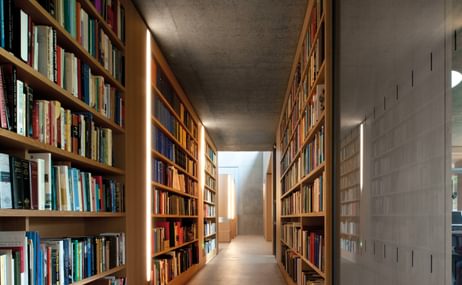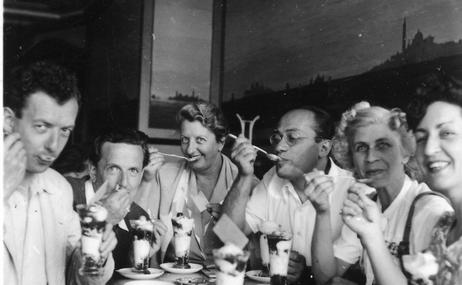The Christmas season was always celebrated with gusto at The Red House. Correspondence and cards found in the Archive collections underline the cheer that family and friends enjoyed in Britten and Pears’s company. But the Archive creates a more poignant atmosphere in December 1976, when the composer lay critically ill.
It was during this time that Pears provided the narration for a new recording of Haydn’s work for string quartet, Seven last words of our Saviour from the Cross, Op. 51. Composed in 1786, the Seven last words
reflects the sorrow of the final seven phrases spoken by the dying Christ. The introduction (Maestoso and adagio) is succeeded by ‘Father, forgive them; for they know not what they do’ (Adagio). A few meditative words follow before the second quotation. The pattern is repeated until a concluding Presto e con tutta la forza, which represents the earthquake after Christ’s death.

1976 recording of the Seven Last Words from the Cross
Haydn’s initial setting was for orchestra, but he arranged the music for string quartet in 1787. In 1976 the Aeolian String Quartet recorded the Seven last words for the Argo record label. In this instance the ‘words’ that followed the quotations from the scriptures were poems that Pears chose from collected editions of verse held in his and Britten’s library.
The Introduction was followed by a reading of (1) John Donne’s A Hymne to Christ. The other selections were (2) George Herbert’s Prayer and A Dialogue between Christian and Death(Adagio); (3) Robert Herrick’s Good Friday: Rex Tragicus, or, Christ going to the Cross(Grave e cantabile); (4) a fifteenth century lyric, Who cannot weep, come learn at me (Grave); (5) Edith Sitwell’s Still falls the rain: The Raids, 1940, Night and Dawn, the text to Britten’s Canticle III (Largo); (6) Edwin Muir’s The Killing; and (7) David Gascoyne’s Tenebrae, Kyrie (Lento).

Pears’s diary entry for the recording of the Seven last Words
Pears’s diary notes that the recording took place on the 1 December. He had recently cut short a tour of North America and returned to England amid concern over Britten’s rapidly deteriorating health. The recording took place just three days before Britten’s death.
Annotations in the volume of John Donne, suggest that Pears worked from the same edition from which Britten selected the settings for The Holy Sonnets of John Donne in 1945. A Hymne to Christ has a suitably retrospective tone. Donne’s speaker sees death as an ‘eternal winter,’ a time of sleep rather than bitterness. Christ is described as ‘th’Eternall root of true love’.
David Gascoyne’s poetry completes the narrative, the titles of both his poems indicating extremes of emotion: Tenebrae implying darkness, and the final lines of Kyrie expressing hope.
Grant us extraordinary grace
O spirit hidden in the dark in us and deep,
And bring to light the dream out of our sleep.
Tenebrae and Kyrie were taken from Gascoyne’s collection, Poems 1937-1943, illustrated by Graham Sutherland. It is one of two copies in the collection. One contains markings by Pears in preparation for his reading, and the other is a second impression which carries the inscription, ‘To Benjamin Britten in deepest admiration,’ which Gascoyne gave to the composer in August 1945.

Christmas 1976, Pears’s first without Britten, must have been a sombre occasion. At the same time his memory was honoured in the tradition of keeping the season. Pears and Britten’s nurse Rita Thomson welcomed Basil Coleman, longstanding friend and colleague of Britten and Pears, to join them in Aldeburgh that year.
Britten, however, wasn’t entirely absent. 19 December 1976 marked the first performance of Britten’s third string quartet, Op. 94, which he completed in Venice in November the previous year. It was premiered at Snape Maltings by the Amadeus String Quartet in a concert that also featured Haydn’s Quartet in E flat major, Op. 64, No. 6 and Beethoven’s Quartet No. 8 in E minor, Op. 59, No. 2. The large audience was introduced to the substantial new piece in undoubtedly moving circumstances. The effect was, cellist Martin Lovett recalled, like hearing ‘a voice from the grave.’ Indeed, a bringing to light of one of Britten’s final works.

You might also like

Archive Treasures: The story of a Holocaust survivor and a musical legacy
We mark the 80th anniversary of the end of World War II, and of the liberation of the death camps with the story of a special…
Archive Treasures: Armenian Amphora
Among the many treasures on display at the Red House is the splendid Armenian amphora. It dates from the Urartu era, a civilization which, from the…
Archive Treasures: The English Opera Group
The English Opera Group collection forms part of the Britten Pears Arts Archive which documents the lives and work of Britten and Pears, as well as…
